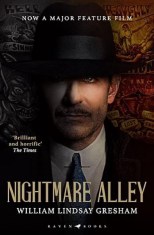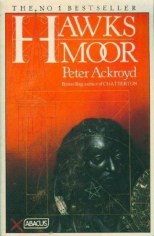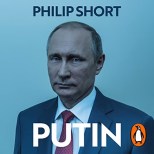So I’m back on the five-books-per-review thing because let’s face it, a dozen-ish (as per my previous entry) is a bit much, even if you’re into the kind of stuff I write. Or the books I read. Or me, really.
On with it.
Nightmare Alley by William Lindsay Gresham.
My rating: five stars.
I remember picking this up after seeing a trailer for the recent Netflix adaptation because obviously was was going to be into the story of carnies, spiritualism, scammery, cross- and double-cross, especially if there’s a del Toro adaptation to inhale afterwards.
Anyway, the source material for a film in which you get to see Bradley Cooper’s wang is a nasty bit of work. Broadly speaking, it opens with characters considering the depths to which a man must sink in order to take work as a carnival geek. (Biting the heads off chickens for the edification of hicks, with payment in booze? That’s an indication that perhaps your life choices have not been optimal.) What follows is the story of how Stan Carlisle, the carny pondering the geek’s lot, swears to avoid this fate and rise to some kind of greatness.
Gresham had experience working as a carny, so the grimy portraiture within these pages is, it seems, pretty true to life. What oozes out, though, is a form of misanthropy, a horror of existence. There’s some Ligotti-grade undervaluation of one’s fellow Earthlings going on in here, though that’s not to say it’s unjustified: there are some real scumbags in this story about escaping the grind, making it big, and the cost of mediocrity.
What sort of God would put us here in this goddamned, stinking slaughterhouse of a world?
There’s a lot lined up for criticism here: small towns, religious scams, the selfishness of the rich, the opportunism of the poor. Gresham spares nobody – nobody – in this work, and it’s as astringent as noir comes. I was still shocked by the ending, even though in retrospect it was probably visible from a long way off. This is testament, I suppose, to the strength of the writing: ghastly vibes, but compelling with it.
After I finished reading the book, I discovered that there’s a much earlier film adaptation of this material, which in a lot of ways is superior, least of all because it stars Tyrone fuckin’ Power, who is basically chiselled out of manliness. It’s great, and very fucking dark. I mean, the material is dark, but the fact that a 1947 film goes there? Amazing. It won’t embed in this post, so check it out on YouTube here – it’s absolutely worth your time.
Libra by Don Delillo.
My rating: five stars.
I was going to proudly begin this review by stating that this was my first Delillo, and that it was a pretty great choice, because it’s a goddamned cracker.
Then I remembered that some years ago, I read Falling Man, his short novel about a September 11 survivor. About which I have retained nothing. Seriously, I only remembered it was a 9/11 novel from a) the title and b) looking up its Wikipedia page.
Hardly a glowing recommendation.
Thankfully, Libra is the polar opposite. It’s a bit like what you’d get if James Ellroy laid off the amphetamines for a sec and stopped with the hepcat patois. (I love the guy, but c’mon Jimmy the E, cut that shit out.) What Delillo presents is neck-deep conspiratorial murk, bifurcated. We get the story of Lee Harvey Oswald’s life, moving inexorably towards a cadre of CIA spooks and schemers with a plot to shoot the President… except the shot’s meant to miss.
(Somewhere, decades hence, also there’s an archivist trying, to make a cogent narrative out of the combination of serendipity and shitty planning that results in a dead JFK, an obliterated Oswald, a seemingly insurmountable task given the amount of paperwork that even covert ops engender.)
Secrets are an exalted state, almost a dream state. They’re a way of arresting motion, stopping the world so we can see ourselves in it.
At times there’s a grasping for the ineffable that seems a bit much, but that’s outweighed by the fact that this is kind of like North by Northwest II: Assassination Boogaloo. It fairly gallops along without leaping the fence into improbability, which with something so minutely observed as the fucking JFK assassination is quite the achievement.
Delillo has been straight about the intention of the book: it makes no attempt to provide factual answers to any questions raised by the assassination. It’s fiction, but one that is rooted in well researched fact. Its title comes from Oswald’s zodiac sign, and it’s dedicated to minutiae, even as it takes in world-shaking (and -shaping) events. The braiding of the two narrative strands is fated and unavoidable because of what we know, but it plants a tiny nugget of doubt – with a bit more panache and self-investigation than most conspiracy nuts could muster – into the accepted history of a dead president. What if it did happen differently? And how much of role do serendipity and circumstance play in what we assume is preordained?
I loved it. If the rest of Delillo’s work is more like this and less like Falling Man, I’m so in.
Hawksmoor by Peter Ackroyd.
My rating: four stars.
Almost a quarter of a century ago I was living in London. I picked this – my first Ackroyd – up because of some messageboard discussions about psychogeography and architecture and the pervasiveness of memory.
I remember going on a walk around London after I’d read it, looking at some of the churches that the book’s namesake, Nicholas Hawksmoor (yes, that one), had designed, and drinking in their essential weirdness, as they’re structures that seem to be just not right in some way – they feel like they’ll fall into the street, or as if they’re constructed from things that shouldn’t really go together in the way they’ve been assembled. Something’s wrong, just below the surface. Something you can’t identify but you know in your bones that it’s there.
Hawksmoor is like that. Deeply weird, kind of off-putting. But it’s the sort of strange that you’re tempted to pick at, to see what eventuates. It’s the story of an architect (and assistant to Christopher Wren), Nicholas Dyer (in all but name, he’s Nicholas Hawksmoor), and, at the other end of time (i.e., the 1980s), a detective called… Nicholas Hawksmoor. Dyer is building churches, but cleaves to an older style of religion that calls for blood consecration of churches. Hawksmoor is investigating murders occurring in those self-same churches.
Needless to say, the vibes are heavy here. It’s deeply indebted to the idea that events leave their traces that echo, to be heard by those with the facility to hear, centuries later. There’s mysteries that seem unanswerable, coincidences and recurrent acts. The loss of one’s faculties and the adoption of mystical insight, the totemic nature of the tramp, and the power of sympathetic magic feature, all in the shadows of London’s streets and the curve of its river. There’s a battle between faith and knowledge, and the winner is not at all certain. The text leaps between 17th century argot and The Bill. Time flows, but not in the way you’d expect.
I probably won’t leave it another 20-something years to read this one again. It has a draw that I cannot explain, but cannot resist.
Putin by Philip Short, narrated by Jonathan Keeble.
My rating: four stars.
This is a mammoth work of biography. Philip Short has created what could well be the biography of Vladimir Putin, and Putin provides an incredible amount of detail on the man who has basically run Russia since 2000.
There’s a fine line Short treads: he explains Putin’s background, and takes great pains to explain the circumstances that informed his upbringing, his politics, and his ambition. But he doesn’t justify or defend the leader, rather highlighting that a lot of what we take to be fact about the man is either a half-truth, or a deliberate misdirection. Things that I figured were absolutely factual (the government’s role in the apartment bombings, say) turn out to be stories with much more nuance than expected.
I certainly now have a much firmer grasp of recent Soviet/Russian history thanks to the scene set by Short in the service of explaining Putin. He traces the developments of recent history with an eye to cutting through knots of intrigue – where he can – and making labyrinthine politicking accessible to people who aren’t policy wonks. I would love to read an updated version of this book in ten or fifteen years, as it comes to a close with Russia’s war on Ukraine, and it feels like there’s a lot more to be written.
Hopefully we’re all around to read it.
I had intended to read this book ever since it came out in 2022. I couldn’t bring myself to make a start on it, no matter how much I wanted to get through it, and when I saw an audiobook option I leaped at it, because I figured that it’d be the only way I’d actually get through the bloody thing. I began listening to this while I was building a cat run, and from then on I was set, largely thanks to Jonathan Keeble’s narration. He’s a suitably stentorian Brit, but it just works with the subject matter. He affects a gruffness for Putin’s direct quotes, and a delightfully awful American accent for when George W. Bush comes to town. It’s not exactly acting, and he’s not doing funny voices – such a thing probably wouldn’t fit with the subject matter – but his sense of timing and inflection really makes this audiobook. I’m certain I wouldn’t have enjoyed it as much with another narrator.
(An odd bonus to this already unsettling work is that the excellent cover design features an image of Vladimir with eyes that follow you no matter which angle you view it from. Applause to whoever laid this up, though I’m not sure that this was a work that necessarily needed to make its reader feel more under observation than the contents already do.)
The Strange Case of Dr Jekyll and Mr Hyde and Other Tales of Terror by Robert Louis Stevenson.
My rating: four stars.
A spur-of-the-moment read, this one. I picked up this edition at a local church book fair. It looked as if it hadn’t been read, and it featured an introduction and notes by Gothic literature scholar Robert Mighall, so it was a no-brainer.
(I also read it as a Buddy Read on TheStoryGraph with my mate Elizabeth, which is A Good Thing People Should Do More Of.)
The stories contained here alongside what’s potentially the thing people mostly know Stevenson for are equally good, and fit in the same spooky mould. (I didn’t know until I read this, for example, that the stories were written as chilling tales for Christmas publication, and would like to vote for the resumption of holiday horror publications thanks very much.) The Body Snatcher and Olalla are dark little forays into some standard Gothic tropes, but still feel surprisingly fresh. Are they stereotypical? In some aspects. But there’s a strain of perversity running through them that I quite enjoyed.
If he be Mr. Hyde, I shall be Mr. Seek!
Speaking of perversion. The main attraction? You know this story. Even if you think you don’t, you do: Dr Jekyll/Mr Hyde. I knew the twist (if it can be called that at this point – how do you spoil a story that’s as old as the Jack the Ripper murders?) going in, but I was surprised at how gripping the story was. And was unprepared for how much it’s a cautionary tale against the horrors masturbation.
This is an excellent collection to plough through in a couple of hours. There is something uniquely grim inside these little tales, and as the quote above indicates, Stevenson would’ve made a great shitposter.
If you’re after some good bookish times, please check out my profile on TheStoryGraph.
If you’d like to buy me some books to review, there’s a wishlist over here.





